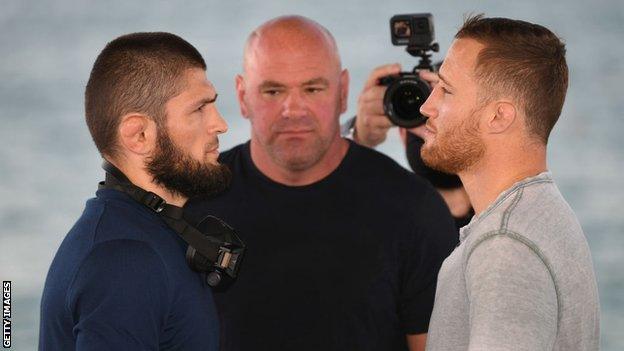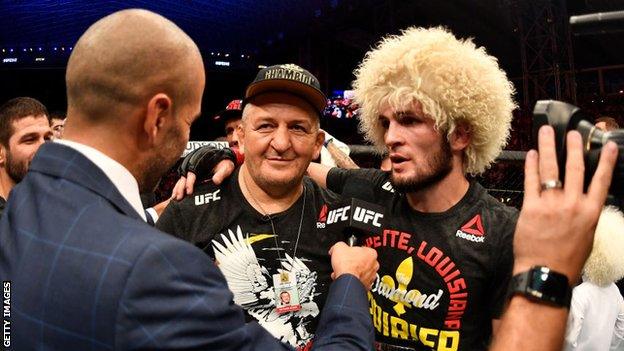UFC 254: Why is Khabib Nurmagomedov so hard to beat?
- Published

Nurmagomedov (left) has been lightweight champion since April 2018, with Gaethje winning the interim belt in May
UFC 254: Khabib Nurmagomedov v Justin Gaethje |
|---|
Venue: Yas Island, Abu Dhabi Date: Saturday, 24 October |
Follow live text coverage of the main card on the BBC Sport website and app from 20:00 BST |
Justin Gaethje will become the latest man to try to beat Khabib Nurmagomedov when he faces the undefeated Russian at UFC 254 on Saturday.
Nurmagomedov, 32, has amassed a 28-0 record in mixed martial arts, becoming one of the UFC's most feared ground-and-pound fighters.
American Gaethje, 31, stands in the way of the UFC lightweight champion becoming arguably the greatest MMA fighter of all time.
Why have so many tried and failed to get the better of Nurmagomedov, and what makes him so menacing? BBC commentator and former UFC fighter Dan Hardy explains.
What makes Nurmagomedov so dominant?
Nurmagomedov was a two-time sambo world champion before focusing on MMA, and uses his grappling skills to smother his opponents, getting them on the ground before beating them into submission.
"He's adapted his wrestling style to suit MMA," says Briton Hardy. "He uses the fence a lot, forcing people into positions where they struggle to defend.
"He gets hold of their legs, rips them out from underneath them and puts them on the canvas. Then as soon as they hit the floor he wraps their legs up with his legs and starts controlling their wrists while at the same time hitting them as much as possible.
"It's a cycle he puts people in, and you have a choice of covering from the punches or getting back to your feet. And he's happy to let you try to get up, so he can start breaking you down again.
"Most times - out of frustration or desperation - people start to turn and put their hands palm down on the floor, and that's when he jumps on their back and sinks a choke in, as we saw against Dustin Poirier and Conor McGregor."
Breaking down his opponents mentally and physically
Nurmagomedov established himself as one of the leading lightweight contenders with a win over Michael Johnson in November 2016.
During the fight, he kept telling Johnson to "give up",, external and Nurmagomedov was saying "let's talk now" to McGregor during their bout after a heated build-up to the first defence of his title in October 2018.
"It's another way of showing how much control he has over them," says Hardy. "The McGregor one was dramatic as there was a lot of talk from McGregor going into the fight, but the scary one for me was when he fought Johnson.
"Khabib has no animosity towards the majority of his opponents - he's not necessarily there to hurt them; he's there to do a job and win the fight. But as he was hitting Johnson he kept saying things like 'I have to fight for the belt, you know I deserve this'.
"That showed a scary calculation, that he's having a thought process the same time as he's dismantling these high-level fighters. It's very unusual. Someone might trash talk to get you to attack. But there's no reason for Khabib to be talking, aside from the psychological impact."
How will the death of his father affect Nurmagomedov?

Nurmagomedov has lost his father Abdulmanap (centre) since his last fight - a win over Dustin Poirier
This fight will be Nurmagomedov's first without his father and coach Abdulmanap in his corner after he died in July, aged 57, following complications caused by coronavirus.
"It makes the next two fights important for him," says Hardy. "His goal was always for Khabib to get to 30-0.
"I don't think it changes anything to his approach. If anything, it makes him more ferocious. Poirier got Khabib in a guillotine up against the fence and you could see his father right there. I can imagine Khabib thinking 'there's no way you're finishing this choke with my father in my corner'.
"Now his father's going to be in his mind so much more. It'll make him far more adamant on beating the next two guys."
Is Gaethje the man to beat Nurmagomedov?
Tony Ferguson's fighting style has long been mooted as the best match for beating Nurmagomedov, but this year a potential meeting between the two was cancelled for a fifth time.
Gaethje, a former wrestler, stepped in to beat Ferguson for his fourth straight knockout win and go 22-2, earning a unification bout with Nurmagomedov.
"At times Khabib's looked uncomfortable on his feet and failed several takedowns, but he's constantly improving - his last two fights have been the best version we've seen of him," says Hardy.
"But this will be his toughest test yet. I've been saying it since Gaethje joined UFC [in 2017], that stylistically he's the best version to beat Khabib.
"He doesn't use takedowns, he uses his wrestling purely defensively, and he's only been taken down twice in his UFC career.
"If he's able to keep this fight on their feet, he's got serious one-punch knockout power. And if there is a facet to Khabib's game where he could be exposed, it's his stand-up game.
"Gaethje can potentially stop those takedowns and force him into a striking exchange, where Gaethje has the bigger calibre gun.
"He'll be up against it for the first 10 minutes. But if he can maintain his conditioning through the third round and onwards, it'll be about low kicks and overhand rights - and Gaethje only needs one."
What next for Nurmagomedov?
Hardy feels the Ferguson fight is "still on the table" for Nurmagomedov but there is "not a convincing argument" for a rematch with McGregor.
"My ideal situation would be for Khabib to give up the lightweight belt undefeated, undisputed, and step up to 170 [pounds, welterweight] to retire with a super fight against the great Georges St-Pierre," he says.
"If he can prove himself with the same style and game plan as GSP, who's considered one of the greatest of all time, that'd be a huge statement.
"If Gaethje can win, it would change the landscape entirely."

Cillian Murphy: Peaky Blinders star shares a chill playlist
The Yungblud Podcast: Fun, chaos and modern-day dilemmas
